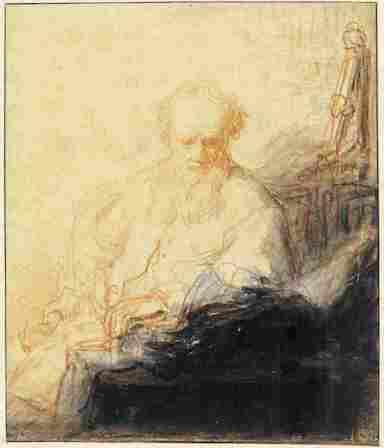 I have been teaching a course on the Yoga Sutras this semester. This brief text – really, just 196 short lines – is a classic of ancient India in the Sanskrit language and nearly 2000 years old. It sketches in detail and with subtlety the process of reaching spiritual maturity, peace and freedom, by a deep quieting of the mind, a growing detachment from everything in the world that we desire most and fear most — a quieting that allows the self to be calm and free, no matter what happens. When we think of yoga, we think of the physical postures, positions of great elegance and beauty that too often seem impossible (at least for me!). Yoga does respect the necessity for equilibrium in body, psyche, mind and heart, but then uses it for the sake of a recovery of one’s deepest self (in utter simplicity) — and, if one pays close attention to the Sutras, a reclaiming of the world around us, freedom within it, energy to move through it with ease, peace, and power.
I have been teaching a course on the Yoga Sutras this semester. This brief text – really, just 196 short lines – is a classic of ancient India in the Sanskrit language and nearly 2000 years old. It sketches in detail and with subtlety the process of reaching spiritual maturity, peace and freedom, by a deep quieting of the mind, a growing detachment from everything in the world that we desire most and fear most — a quieting that allows the self to be calm and free, no matter what happens. When we think of yoga, we think of the physical postures, positions of great elegance and beauty that too often seem impossible (at least for me!). Yoga does respect the necessity for equilibrium in body, psyche, mind and heart, but then uses it for the sake of a recovery of one’s deepest self (in utter simplicity) — and, if one pays close attention to the Sutras, a reclaiming of the world around us, freedom within it, energy to move through it with ease, peace, and power.
All this comes to mind as this Sunday (October 4, the 27th Sunday in Ordinary Time) we return again to St. Paul’s Letter to the Philippians. Paul is not only a man with a mission, but a man striving as best he can to keep the faith, even in a time of deep uncertainty — will he die in prison? is his life’s work a waste? — as he hopes by this letter to bring to life for his readers his vision of faith fully alive.
Last week we saw him begging his readers to live with the mind and spirit of Christ in them — not only if they are called to martyrdom, but especially if they are called to live a long and steady life in community, risking all in the hands of God in the day to day fidelity of small things. As the letter goes on he strips away all that is unnecessary, simplifying the very meaning of the spiritual life, that all might be restored. In Philippians 3, he did the hard work of discarding false self and welcoming true Self:
Confronting the ego: On the one hand, he knows that he is of a privileged background:
"…If someone else thinks they have reasons to put confidence in the flesh, I have more: circumcised on the eighth day, of the people of Israel, of the tribe of Benjamin, a Hebrew of Hebrews; in regard to the law, a Pharisee; as for zeal, persecuting the church; as for righteousness based on the law, faultless." (3.4-6)
Detachment, loss, and rebirth in Christ: On the other, Paul is ready now to throw it all aside, once more gambling on Christ alone:
"But whatever were gains to me I now consider loss for the sake of Christ. What is more, I consider everything a loss because of the surpassing worth of knowing Christ Jesus my Lord, for whose sake I have lost all things. I consider them garbage, that I may gain Christ and be found in him, not having a righteousness of my own that comes from the law, but that which is through faith in Christ—the righteousness that comes from God on the basis of faith. I want to know Christ—yes, to know the power of his resurrection and participation in his sufferings, becoming like him in his death, and so, somehow, attaining to the resurrection from the dead." (3.7-10)
Or as Paul puts it still more starkly in Galatians, "It is no longer I who live, but Christ Jesus who lives in me." (2.20)
Openness to the future: This surrender of his own self-identity and self-control opens into a still greater freedom at the race’s end:
"Not that I have already obtained all this, or have already arrived at my goal, but I press on to take hold of that for which Christ Jesus took hold of me. Sisters and brothers, I do not consider myself yet to have taken hold of it. But one thing I do: Forgetting what is behind and straining toward what is ahead, I press on toward the goal to win the prize for which God has called me heavenward in Christ Jesus." (3.12-14)
Imagining the new self: Now, in Philippians 4 whence today's actual reading is taken, Paul consolidates the series of virtues he has found to be basic to his own life, for the sake of their lives too:
"Rejoice in the Lord always. Again I say, rejoice! Let your gentleness be known to all people. The Lord is at hand. Be anxious for nothing, but in everything by prayer and supplication, with thanksgiving, let your requests be made known to God; and the peace of God, which surpasses all understanding, will guard your hearts and minds through Christ Jesus." (4.4-7)
Like the discipline of letting go and finding simplicity in nothing but Christ, these virtues too flow together: joy, gentleness, lack of anxiety, prayer, thanksgiving, deep and endless peace in Christ. Together they are basic to a person and a community filled in Christ, detached from self and world, yet deeply happy and deeply at peace.
 It would make sense for Philippians to end here, under the protection of Christ, the community at peace in mind and heart. But what is most striking is the next verse:
It would make sense for Philippians to end here, under the protection of Christ, the community at peace in mind and heart. But what is most striking is the next verse:
Recovering the whole world: "Finally, sisters and brothers, whatever things are true, whatever things are noble, whatever things are just, whatever things are pure, whatever things are lovely, whatever things are of good report, if there is any virtue and if there is anything praiseworthy—meditate on these things." (4.8)
With no restrictions, no religious boundaries, all things surrendered by now, Paul begs his readers to receive back the entire world: fear nothing, embrace every human value, art and culture, the true and the holy, virtue and love. Whatever meets these criteria, wherever they are to be found — can become the object of Christian contemplation. In the world of Greece and Rome, this is a very early manner of Christian humanism: all that is human is from God, humans fully alive are the glory of God (as St. Irenaeus might have put it).
Give up everything, receive it all back. I am calling this the “Yoga of St. Paul” not to literally indicate that he practiced yoga (though he would not have been less a saint had he done so), but rather to highlight that his long years of spiritual practice as pious Jew, fiery zealot and Christian missionary, prisoner facing death, together chart an advance in wisdom, a deep human (and humane) learning, a steady Christian maturing that by way of surrender embraces all of God’s world. The world is good and beautiful, sin and ugliness not withstanding, and now it is all yours, my sisters and brothers in Philippi.
Such a vision was surely as improbable then as it is now in our sordid 2020. We are at a loss in this interminable pandemic year, imprisoned, in doubt about the future of ourselves, our country, our world, wondering whether it still makes sense to still bet on human decency and Christian virtue. Part at least of what we used to be is gone forever. But Paul tells us first to keep on, to go deeper, retrieving our true selves, stripping away the surfaces, not only to stabilize a Christian identity that will survive the pandemic, but also to reclaim the world around us: worthy of our contemplation each day, deep down still true, noble, just, pure, lovely, rich in virtue, deserving our thanks and praise.
Thus this Sunday’s vision, the yoga of St. Paul. But let me end by turning to another great figure in Christian history, the poor man of Assisi. This Sunday, October 4, is the feast of St. Francis, the most universally beloved of all the saints. He too gave up everything, literally stripped off his clothing and returned it to his merchant father, even as he renounced his inheritance and walked away, no longer protected against life's uncertainties. He took to heart in a most literal way the call to rebuild the Church, stone by stone, heart by heart. He loved the Crucified Jesus to the point of his own crucifixion, enduring the stigmata's nail holes in his hands and feet.
 But for him too, the loss of everything ended in reclaiming the world around him, and this is why he could preach even to the birds, and sing his great Canticle of Sun and Moon:
But for him too, the loss of everything ended in reclaiming the world around him, and this is why he could preach even to the birds, and sing his great Canticle of Sun and Moon:
Praised be You my Lord with all Your creatures, especially Sir Brother Sun,
Who is the day through whom You give us light.
And he is beautiful and radiant with great splendor,
Of You Most High, he bears the likeness.
Praised be You, my Lord, through Sister Moon and the stars,
In the heavens you have made them bright, precious and fair.
Praised be You, my Lord, through Brothers Wind and Air,
And fair and stormy, all weather’s moods, by which You cherish all that You have made.
Praised be You my Lord through Sister Water, so useful, humble, precious and pure.
Praised be You my Lord through Brother Fire,
through whom You light the night and he is beautiful and playful and robust and strong.
Praised be You my Lord through our Sister, Mother Earth who sustains and governs us,
Producing varied fruits with colored flowers and herbs.
Praise be You my Lord through those who grant pardon for love of You and bear sickness and trial.
Blessed are those who endure in peace, By You Most High, they will be crowned.
Praised be You, my Lord through Sister Death, from whom no-one living can escape.
Praise and bless my Lord and give Him thanks, and serve Him with great humility. Amen!
Find the whole of the Canticle here, and listen to this lovely and familiar setting. Then sit quietly, breathe deeply, and ponder your own yogic path these past six months.

